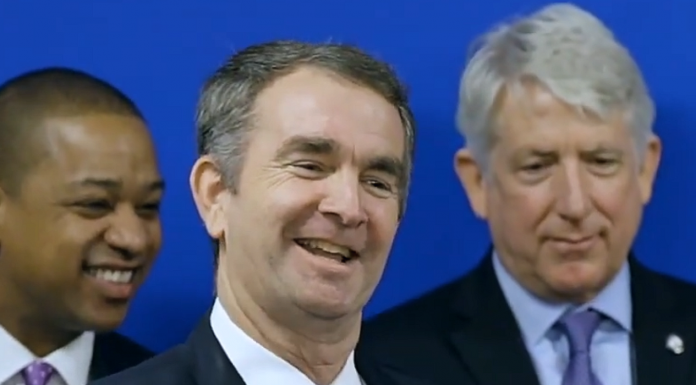On the heels of a sweeping legislative overhaul that has made once conservative Virginia a full-fledged leftist stronghold resembling blue “sanctuary” states like California, the emboldened Democrat legislature is now taking up one of its most controversial packages yet.
Virginia Democrats say they are looking to make transformational change to the state’s criminal justice system—just a few months after taking a slightly less ambitious approach.
The killing of George Floyd and widespread protests over police violence have prompted leftist lawmakers and their activist allies to promise sweeping changes to the criminal justice system.
“I think we’re all tired of the incremental change that has failed us and failed our community members for so long,” Portsmouth Commonwealth’s Attorney Stephanie Morales said on a conference call recently organized by Senate Democrats.
“We want to do as much as possible as quickly as possible,” she said, likely anticipating a backlash next year, when Gov. Ralph Northam reaches the end of his deeply divisive term.
Northam’s legacy was blighted by a minor hiccup after racist photos from his medical school yearbook surfaced in early 2019.
Defying near universal calls to resign, though, he caved to radical activists in the state and assented to a wish-list of extremist demands should Democrats regain power for the first time in two decades.
Outside interest groups then flooded Virginia during its elections last November, seeing their opportunity to transform the state—both a symbolic and, in many ways, a politically strategic coup for the far left.
Northam and his corrupt cohorts have ridden the wave much farther, however, than even they anticipated as they pursue a winner-take-all agenda that has outraged the state’s conservative rural areas.
Some considered the possibility of seceding to join West Virginia during a contentious gun-rights dispute in January.
Democrats already had pushed for shocking changes within the state’s criminal-justice apparatus, but supporters were disappointed earlier this year when many of their proposals were put off for a year or sent to a commission for study.
Activists criticized the lawmakers for being too timid, passing some minor reforms but punting on major issues. That included bills to end solitary confinement, abolish the death penalty and make it easier to expunge criminal records for misdemeanor and nonviolent felony convictions.
But after Floyd’s killing sparked nationwide protests—including in Virginia where several Confederate monuments have been taken down—lawmakers pledged to make criminal justice a key part of a special session scheduled in August.
The session was initially set just to focus on state budget shortfalls due to the coronavirus pandemic.
Lawmakers recently began to hold hearings on criminal justice proposals that have been suggested by the Virginia Legislative Black Caucus, the Democratic Senate Caucus and a group of liberal-leaning county prosecutors.
Those proposals include banning choke holds, giving prosecutors unrestricted access to all reports and disciplinary records of police officers and downgrading the charge of assault on a police officer from a felony to a misdemeanor in cases where the officer is not injured.
John W. Jones, executive director of the Virginia Sheriff’s Association, said he’s worried what kind of message passing that law would send about keeping police safe.
He also said he’s nervous lawmakers will enact bad policy by trying to do too much too fast. A particular concern is a push to weaken immunity provisions for law enforcement officials from lawsuits.
“I’m really concerned about some of these really important issues being rushed through without due process,” Jones said.
Other proposals Democrats and their allies support include requiring that most warrants are served during the daytime, and that a judge, not a magistrate, approve any no-knock or nighttime warrants.
They say the proposals that are aimed at preventing cases similar to Breonna Taylor, who was fatally shot by police conducting a no-knock warrant at her home in Kentucky earlier this year.
Some libertarians, including Kentucky Sen. Rand Paul, have also been vocal supporters of those measures—which touch on Fourth Amendment privacy rights.
However, others note that Taylor, far from being the saint she was portrayed to be, may have been supporting her boyfriend in a major drug-running operation and interfered with law-enforcement during the bust.
State Sen. Scott Surovell echoed the worries of Virginia law enforcement. The swing-district Democrat said some lawmakers “wanted to go a little slower and take a little harder look at things” earlier this year, but he’s hopeful the events of the last few months have brought the need for immediate reform into focus.
“The pace was really more of an issue than the policy,” Surovell said.
House Del. Patrick Hope, who is helping lead House committee hearings on criminal justice reform, said Floyd’s death convinced him and other lawmakers that “decisive” action is needed.
“The sense of urgency is growing, and we cannot ignore these issues any longer,” Hope said Wednesday at a virtual committee hearing.
The American Civil Liberties Union of Virginia is focusing on increasing police accountability, in part by establishing a set of professional standards of conduct for officers that, if violated, could result in the loss of their police certification.
Currently, police officers in Virginia can only lose their certification if they fail to complete mandatory training or are convicted of a felony or certain misdemeanors. Under the proposal, they could face the loss of their certification for misconduct, including the excessive use of force.
“Law enforcement should be treated as a profession,” said Claire Gastanaga, executive director of the ACLU of Virginia. “And police—if they want to be treated like professionals —need to understand they can lose their license for misconduct.”
Despite the new urgency in the need for reform, lawmakers invoked the race card in an effort to temper expectations that all of the controversial reforms will pass this special session.
“This was the capital of the Confederacy, these are not problems that materialized overnight and they will not be fixed overnight,” said Sen. Mamie Locke. “We have our work cut out for us.”
Adapted from reporting by the Associated Press

